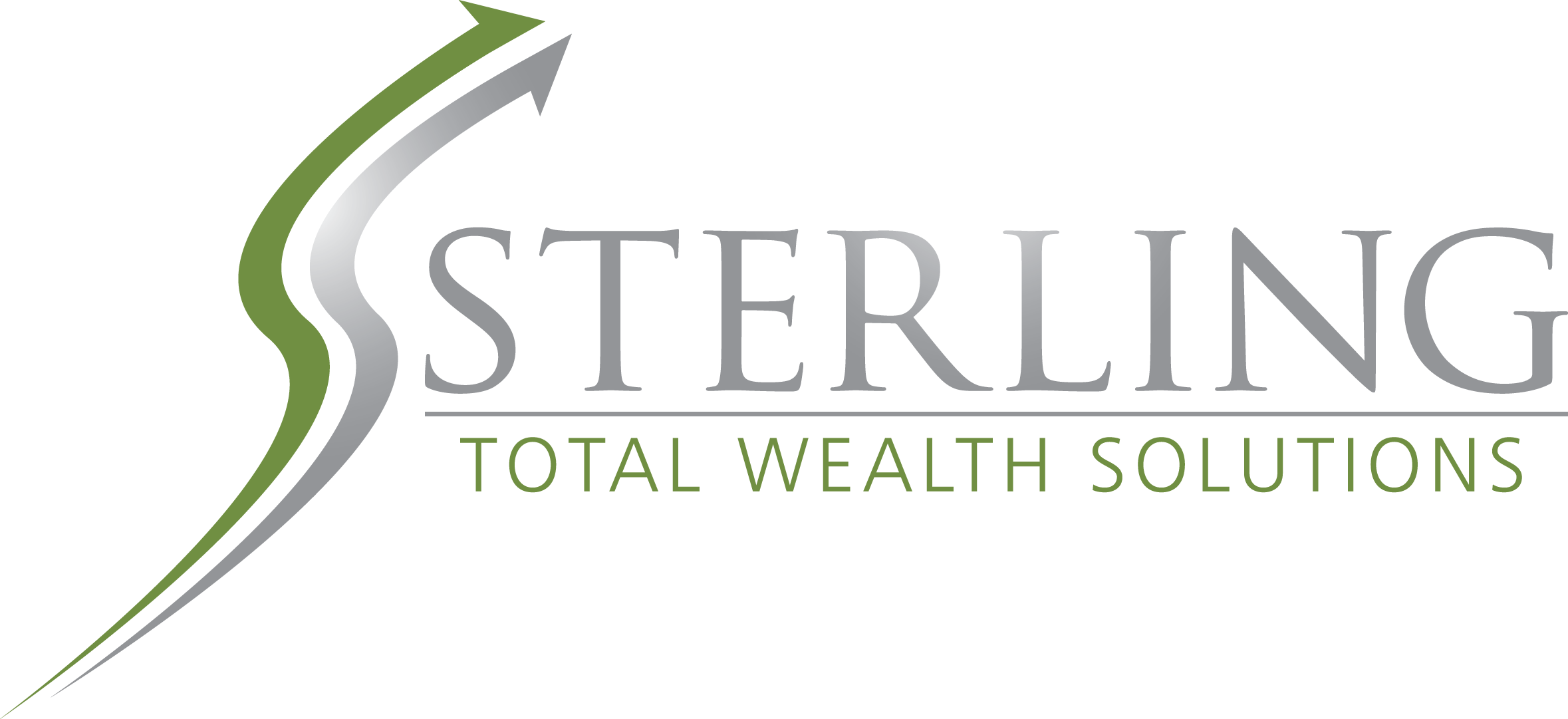In this month’s recap: Reports of a new COVID-19 variant blindsided markets as a wave of late selling erased the month’s earlier gains.
Monthly Economic Update
Monthly Economic Update | Presented by Sterling Total Wealth Solutions | December 2021
Click here to receive Economic Updates in your Inbox: Subscribe
U.S. Markets
Reports of a new COVID-19 variant in late November roiled markets as a wave of selling erased the month’s earlier gains.
The Dow Jones Industrial Average took the hardest hit, dropping 3.73 percent. The Standard & Poor’s 500 Index fell 0.83 percent while the Nasdaq Composite managed a small gain of 0.25 percent.1
Thanksgiving Surprise
The markets were blindsided by news over Thanksgiving Day of the emergence of a new strain of COVID-19, which led to travel bans by multiple countries and renewed unease about the prospect of a return to economic and social restrictions.
The potential global spread of this new COVID-19 variant Omicron triggered fears of another round of economic deceleration, sending investors back to their pandemic playbook of selling travel and leisure, financials, energy, and cyclicals and buying pharmaceutical companies and stay-at-home stocks.
Volatile Trading
The sharp drop on Friday, November 26, was exacerbated by reduced liquidity in the markets due to many traders being absent on this normally quiet post-holiday, shortened trading session. Stocks rebounded as traders returned to work on the following Monday but were unable to hold their gains on the month’s final trading day.
Upbeat Company Reports
The month had started off on a strong note, helped by a string of positive corporate earnings surprises, optimistic forward guidance from companies, and solid economic data. Investors were particularly encouraged by the fact that businesses had navigated the challenges of a surge in Delta variant infections in the third quarter, rising inflation, and supply chain bottlenecks.
Fed Headlines
Developments in Federal Reserve policy dominated much investor attention throughout the course of November. The first of these was the Fed announcement that it would begin its bond tapering program. Markets were unfazed by this news as they had long anticipated that the Fed would soon commence paring back its monthly bond purchases.
The second was the uncertainty surrounding whether Jerome Powell would be renominated to serve another four years as Fed chair. When President Biden finally announced his decision to renominate Powell, bond yields rose as investors became more certain that the Fed’s monetary normalization policy would proceed as planned.
Omicron Uncertainty
The consensus narrative of healthy economic expansion in 2022 was left a bit dented by the introduction of the Omicron variant. Many questions surround the new variant and its impact on global economies. Markets don’t always respond efficiently within an information void, creating the potential for further volatility until more is known about Omicron.
Sector Scorecard
Industry sector performance was mixed in November. Gains were posted in Consumer Discretionary (+3.03 percent), Consumer Staples (+1.25 percent), Materials (+1.97 percent), Real Estate (+1.21 percent), Technology (+5.33 percent), and Utilities (+1.26 percent). Losses were experienced in Communications Services (-3.06 percent), Energy (-2.73 percent), Financials (-3.40 percent), Health Care (-1.11 percent), and Industrials (-1.05 percent).2
What Investors May Be Talking About in December
In the coming weeks, markets will be sorting out news from Washington, updates on COVID variant Omicron, and economic reports.
On the economic front, investors are expected to keep a close eye on retail sales for the month of November, which are scheduled for release December 15. The November report will include the post-Thanksgiving start to the holiday shopping season and potentially be an advanced read on whether the supply chain bottlenecks might hamper holiday sales.3
Another anticipated report will be the Consumer Price Index, which will give an update on inflation trends. It’s due on December 10. If inflation continues to run hot, it may test investor confidence.4
World Markets
A resurgence of Delta variant infections, spreading economic and social restrictions, and the emergence of a new COVID-19 variant sent international stocks broadly lower, with the MSCI-EAFE Index falling 3.79 percent in November.5
Major European markets dropped, with losses in Germany (-3.75 percent), the U.K. (-2.46 percent), and France (-1.60 percent).6
Pacific Rim markets also were under pressure. Hong Kong lost 7.49 percent, Japan tumbled 3.71 percent, and Australia slipped 0.92 percent.7
Indicators
Gross Domestic Product: Economic growth in the third quarter was revised slightly higher, to 2.1 percent from 2.0 percent.8
Employment: Job growth rebounded as employers added 531,000 jobs in October. The unemployment rate fell to 4.6 percent, though the labor participation rate stayed stubbornly low at 61.6 percent.9
Retail Sales: Retail sales rose 1.7 percent, exceeding expectations. This gain was, in part, attributed to higher costs and the pulling forward of holiday shopping as consumers worried about low inventory during the holiday season.10
Industrial Production: Industrial output rose 1.6 percent in October, reversing September’s slide. About half of the monthly gain was attributed to the recovery from Hurricane Ida.11
Housing: Housing starts slipped 0.7 percent in October, a surprise downturn for market watchers who had expected an increase.12
Existing home sales rose 0.8 percent, though it was off 5.8 percent from October 2020, which represents a cyclical high.13
New home sales increased 0.4 percent, though they were lower by 23.0 percent from a year earlier. The median price jumped nearly 18.0 percent year-over-year to $407,700.14
Consumer Price Index: The prices of consumer goods and services increased 0.9 percent in October and jumped by 6.2 percent year-over-year. This represented the fifth straight month of over 5 percent annualized inflation and the sharpest year-over-year increase since 1990.15
Durable Goods Orders: Orders for long-lasting goods fell 0.5 percent, the second straight month of declines. However, excluding transportation, durable goods orders increased by 0.5 percent.16
TIP OF THE MONTH

Exercise is not only wise, it may also prove economical. In the long run, just keeping fit may save you thousands of dollars (or more) in medical bills that an unhealthy person may incur.
The Fed
Minutes from the November Federal Open Market Committee (FOMC) meeting showed an increasing concern over the persistence of inflation with the admission that inflationary pressures may take longer to abate than previously anticipated.
“The (Fed’s) near-term outlook for inflation was revised up, as consumer food and energy prices had risen faster than expected and production bottlenecks and recent wage gains were seen as putting somewhat greater upward pressure on prices than had been anticipated,” according to the minutes released following the Fed’s two-day meeting that ended November 3.17
Reflecting that concern, several officials suggested that the Fed’s bond tapering program may have to be accelerated in order to be ready to raise rates should inflation persist.18
|
MARKET INDEX |
Y-T-D CHANGE |
November 2021 |
|
DJIA |
12.67% |
-3.73% |
|
NASDAQ |
20.56% |
0.25% |
|
S&P 500 |
21.59% |
-0.83% |
|
|
||
|
BOND YIELD |
Y-T-D |
November 2021 |
|
10 YR TREASURY |
0.52% |
1.44% |
Sources: Yahoo Finance, November 30, 2021
Indices are unmanaged, do not incur fees or expenses, and cannot be invested into directly. These returns do not include dividends. 10-year Treasury real yield = projected return on investment, expressed as a percentage, on the U.S. government’s 10-year bond.
QUOTE OF THE MONTH

-
“Create the highest, grandest vision possible for your life, because you become what you believe.”
OPRAH WINFREY
THE MONTHLY RIDDLE

You see a large truck stopped just before the underpass of a low bridge. The driver informs you that his truck is 1″ higher than the maximum clearance. This is the only road to his destination. What is the easiest way to help him get his truck through the underpass?
LAST MONTH’S RIDDLE: When can you add two to eleven and get one as the correct answer?
ANSWER: When you are figuring time. When you add two hours to eleven o’clock, you get one o’clock.
Securities offered through Registered Representatives of Cambridge Investment Research, Inc., a Broker/Dealer, Member FINRA/SIPC. Advisory services offered through Cambridge Investment Research Advisors, Inc., a Registered Investment Advisor. Sterling Total Wealth Solutions and Cambridge are not affiliated.
To learn more about Sterling Total Wealth Solutions, visit us on the web at www.sterlingtotalwealthsolutions.com
Know someone who could use information like this? Please feel free send us their contact information via phone or email. (Don’t worry – we’ll request their permission before adding them to our mailing list.)
CITATIONS:
- WSJ.com, November 30, 2021
- SectorSpdr.com, November 30, 2021
- Census.gov, 2021
- BLS.gov, 2021
- MSCI.com, November 30, 2021
- MSCI.com, November 30, 2021
- MSCI.com, November 30, 2021
- CNBC. November 24, 2021
- WSJ.com, November 5, 2021
- CNBC.com, November 16, 2021
- MarketWatch.com, November 16, 2021
- CNBC.com, November 17, 2021
- CNBC.com, November 22, 2021
- APNews.com, November 24, 2021
- WSJ.com, November 10, 2021
- CNBC.com, November 24, 2021
- FederalReserve.gov, November 24, 2021
- WSJ.com, November 24, 2021
